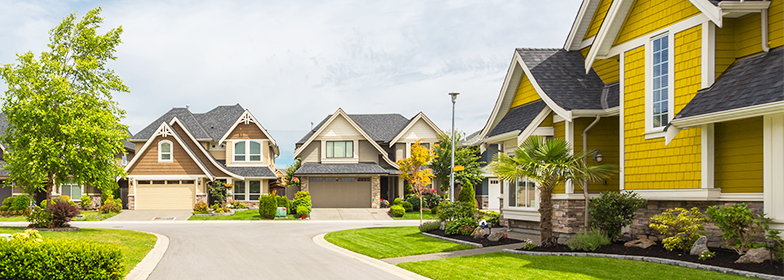
Gated communities near me
Gated communities are residential properties with homes that are only accessible to residents and their visitors. Community benefits can include a sense of safety, enhanced security features and amenities like clubhouses and private parks. Learn more about the perks and disadvantages of gated neighborhoods to determine if a gated community is right for you.
What are the types of gated communities?
All types of homes, such as townhomes, duplexes, condo units in multi-story buildings and single-detached houses, can be found within gated communities. Gated communities come in different shapes and sizes. They mainly fall into these three categories.
- 1. Planned communities
These are self-contained, pre-planned towns often located outside major metropolitan areas. They may be centered around easily accessible amenities such as clubhouses, shopping centers and outdoor recreational activities.
- 2. Active adult and assisted living communities
Age-restricted lifestyle communities attract retirees looking to stay active while reducing time spent on home maintenance and landscaping. Communal facilities can also give seniors a sense of community and social connectivity.
- 3. Lifestyle communities
These communities focus on activities centered around leisure, such as golf, boating or tennis.
What are the advantages of living in gated communities?
Residents seeking a sense of community, less traffic and shared neighborhood amenities have made gated communities one of the fastest-growing types of housing developments. Here are some other reasons for their popularity:
- Save money on insurance
Just as you may get a discount on your homeowners insurance for a home with a security system installed or one near a local fire department, insurance companies may also reduce monthly premiums for a home in a gated community. For example, you may save by buying in a neighborhood with a 24-hour staffed security gate and 24-hour security patrol instead of an area with no security features.
- Greater sense of security
With higher security measures that restrict traffic to residents, visitors and delivery people, gated communities may have less-through traffic and more privacy. There may also be less speeding since cars slow at the gated entrances.
- Lower home maintenance
When it comes to finding a home loan, the younger generation also turns to the internet. Online mortgages are the new norm, “they love simple user experiences, quick digital communication and on-demand service for when they’re ready to buy,” reports Forbes.
- Plenty of amenities
Many gated communities include access to shared neighborhood amenities and leisure facilities that the HOA maintains. These might include swimming pools, tennis courts, parks and community clubhouses.
What are the disadvantages of living in gated communities?
Living inside gates means following the guidelines of the neighborhood. Some homebuyers may consider this a disadvantage, along with higher housing costs and longer commutes. Other disadvantages may include:
- Restrictive rules and regulations
If you want flexibility and control over updating your home’s exterior, a gated community with an HOA may not be a good fit. Most HOAs have strict building codes and restrictions on lawn maintenance, paint color, street parking, noise and even holiday decorations.
- Higher prices
Homes in gated communities can sell at a premium compared with similar non-gated properties. In addition, if your gated community has a homeowners association, you’re responsible for paying monthly fees for the upkeep of common areas as well as building maintenance.
- Longer drive times
Because medical facilities, schools and restaurants are likely to be outside of your gates, you might find yourself spending longer in the car to go out or run errands.
Are gated communities safer than other areas?
Studies have shown that higher security in gated communities may be a perception rather than a reality. An analysis of several communities in Florida determined that safety in gated subdivisions closely matched open communities. Not all entrance gates are alike for gated communities which may also affect security. For example, some have gates staffed with security guards; others may require a code to enter through a passkey gate.
What amenities are common in gated communities?
When you purchase a home in a gated community, you’re also buying a lifestyle. The shared amenities vary, but they may include:
- Private parks
- Dog parks
- Playgrounds
- Community clubhouses
- Exercise facilities
- Tennis courts
- Swimming pools
When it comes to finding your ideal home, there’s a lot to consider. Learn more about how to prepare for homeownership with the Guild Mortgage homebuyers loan guide.
The above information is for educational purposes only. All information, loan programs and interest rates are subject to change without notice. All loans subject to underwriter approval. Terms and conditions apply. Always consult an accountant or tax advisor for full eligibility requirements on tax deduction.
